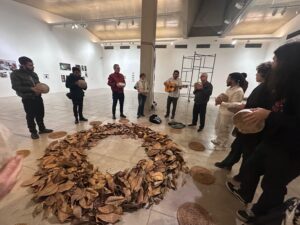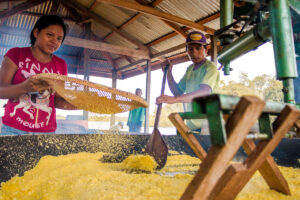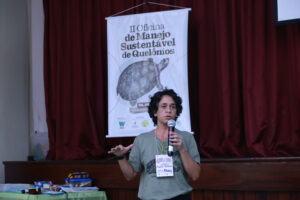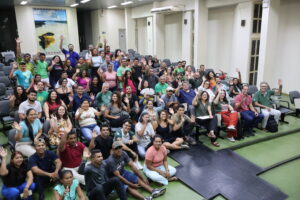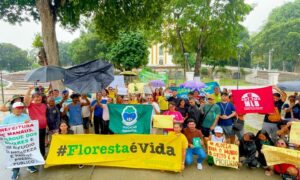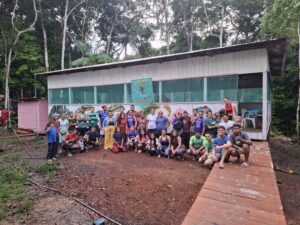One of the main events in the country focused on extractive activities was attended by indigenous peoples, traditional communities and public managers to think about economic development combined with the conservation of socio-biodiversity
By Nathália Messina, Jessica Souza, Talita Oliveira and Renata Monty
Translated by Laiane Lessa
The Socio-biodiversity week coordinated by the National Council of Extractive Peoples (CNS) supported by various organizations and aligned entities, took place for the first time in 2003, between August 31ᵗʰ and september 6ᵗʰ, in the federal capital, Brasilia, at the CONTAG (National Confederation of agriculture workers) headquarters.
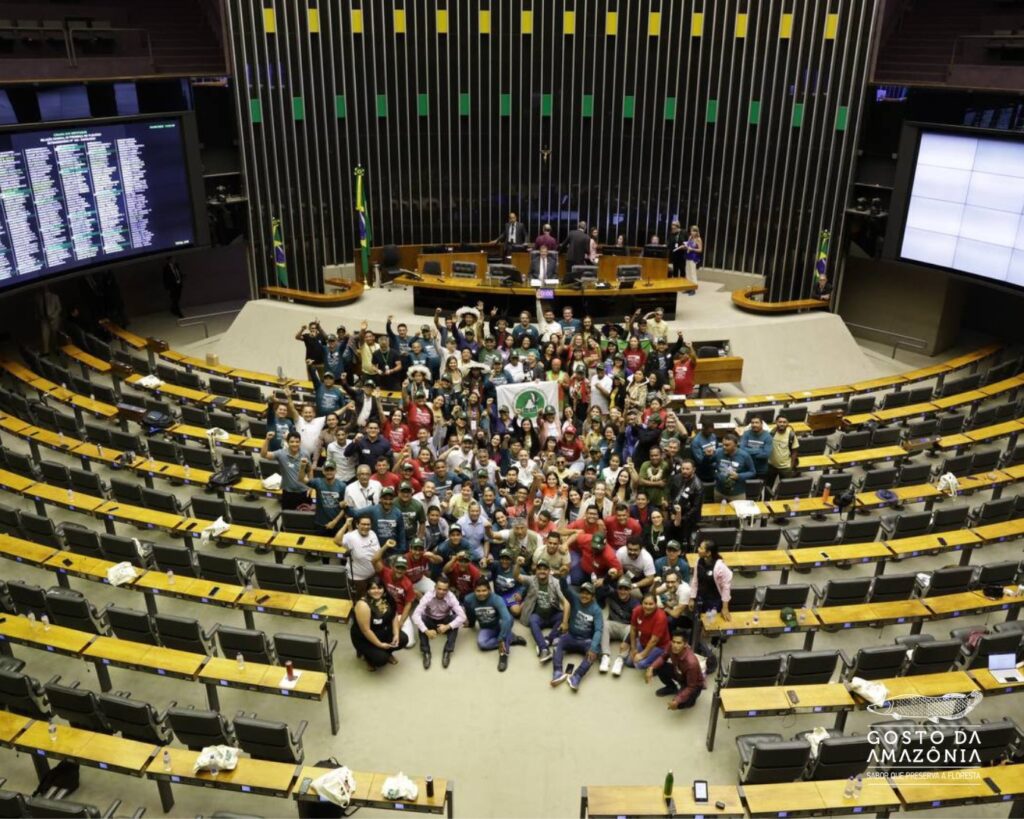
Featuring an intense program dedicated to strengthening the economies of water and forest communities, the event welcomed representatives from the Pan-Amazon and other Brazilian biomes. Around 230 leaders from approximately 100 community-based organizations and various partner entities were present. The schedule was divided into two agendas, with the first one consisting of a sectoral meeting for the Chesnut, Arapaima and Rubber collective, taking place between August 31ˢᵗ and September 2ⁿᵈ. The second agenda, aimed at political advocacy, took place from September 4ᵗʰ to 6ᵗʰ.
“A SocioBiodiversity Week was a platform for strengthening the economies of products from the Amazon’s socio biodiversity, designed as a space to promote dialogues and collaborations. The fact that it was held in Brasilia also allowed for a week of significant engagement having a very strong presence and representation from the Federal Government, the Ministry of Agrarian Development, and the Ministry of the Environment. It was a space for dialogue and collaboration among different sectors and networks, with a special emphasis on the Amazon region”, defined Leonardo Kurihara, an indigenous specialist from the Native Amazon Operation (OPAN).
Dialogues among the socio-biodiversity chains
In the sectoral programming, each of the collective organized itself to attend to their specific demands. The Chestnut and Arapaima collective promoted internal and external agendas to advance in accessing public policies discussions for adding values to their products, project presentations, among other activities. As for the Rubb group, after days of debate and planning, they formalized the creation of Native Amazon Rubber Collective bringing together rubber tappers with technical and scientific support institutions in favor of the product chain.
At the conclusion of the sectoral session (Saturday, September 2ⁿᵈ), an integrative activity based on a rotating group dynamic, aimed to spark engagement, dialogue and priorities which culminated in the SocioBiodiversity Week Letter. This document, crafted through collective intelligence was forwarded to relevant authorities capable of unlocking governmental programs, projects, and potential policies capable of promoting socio biodiversity chain.
On September 2ⁿᵈ the SocioBiodiversity fair hosted a gathering centered around the economies of water and forest with artisanal products, music and art. The fair showcased artisanal products brought from various territories by the participants, including chestnut, vegetable oil, cookies, flours, chocolate, clothing, footwear, bio-jewelry, baskets and of course sustainable managed arapaima – ‘Taste of Amazon’, a success that sold out the products brought by the handlers and helped promote riverine commerce in the federal capital.
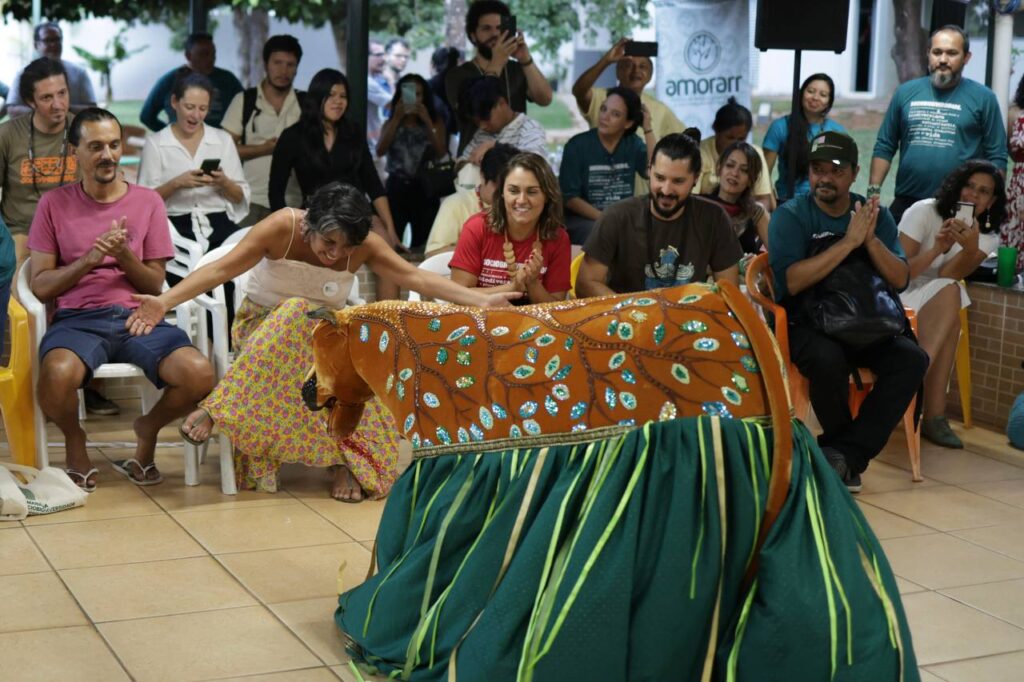

Political impact on the national scene
The political agenda was initiated on September 4ᵗʰ at the National Congress, with representatives from all three branches of the Brazilian state – legislative, judicial, and executive. The diversity of indigenous and extractive peoples took over the Chamber of Deputies for technical-political articulations in a session convened in the morning and a solemn session in the afternoon.
The public hearing on “Labor Rights and Socio-Biodiversity Economies” was authorized by the congressman Airton Faleiro, and included the Labor Committee. Having slogans such as “Demarcation Now!”, “Territory Now!”, and “Dignity in Work Now!”, the civil society present in the plenary demanded their rights, signaling that one of the fundamental aspects of a dignified work relationship is the recognition and guarantee of the inhabited territories, a message that was reinforced in the speech by the Secretary-General of the CNS, Mr. Dione Torquato, from Amazonas.
In the afternoon, at the solemn session in honor of Amazon Day and the 35ᵗʰ Anniversary of Chico Mendes legacy, which had the presence of the distinguished Minister of Environment and Climate Change, Marina Silva, a fellow fighter alongside rubber tappers of the CNS, discussions were held regarding the progress and challenges for the traditional common-use territories in the Amazon, in anticipation of COP-30 to be held in Belém in 2025.
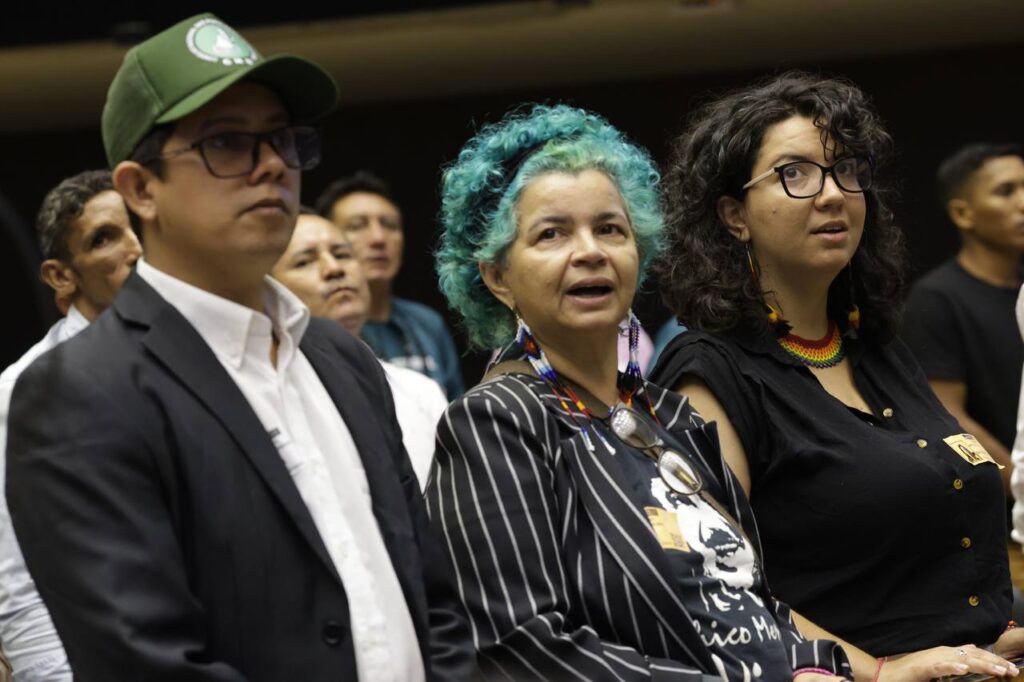
Celebrations and political dialogue on Amazon Day
The celebrations continued on September 5ᵗʰ, Amazon Day, when the delegations from the SocioBiodiversity Week proceeded to the main hall of the Planalto Palace. On that occasion, participants had the opportunity to deliver the collectives’ letter to Mr. Agostinho (President of Ibama), Mr. Minister Flávio Dino (Ministry of Justice and Public Security), Mrs. Minister Sônia Guajajara (Ministry of Indigenous People), and the Arapaima Collective sent a visibility kit with the manifesto letter to President Lula.
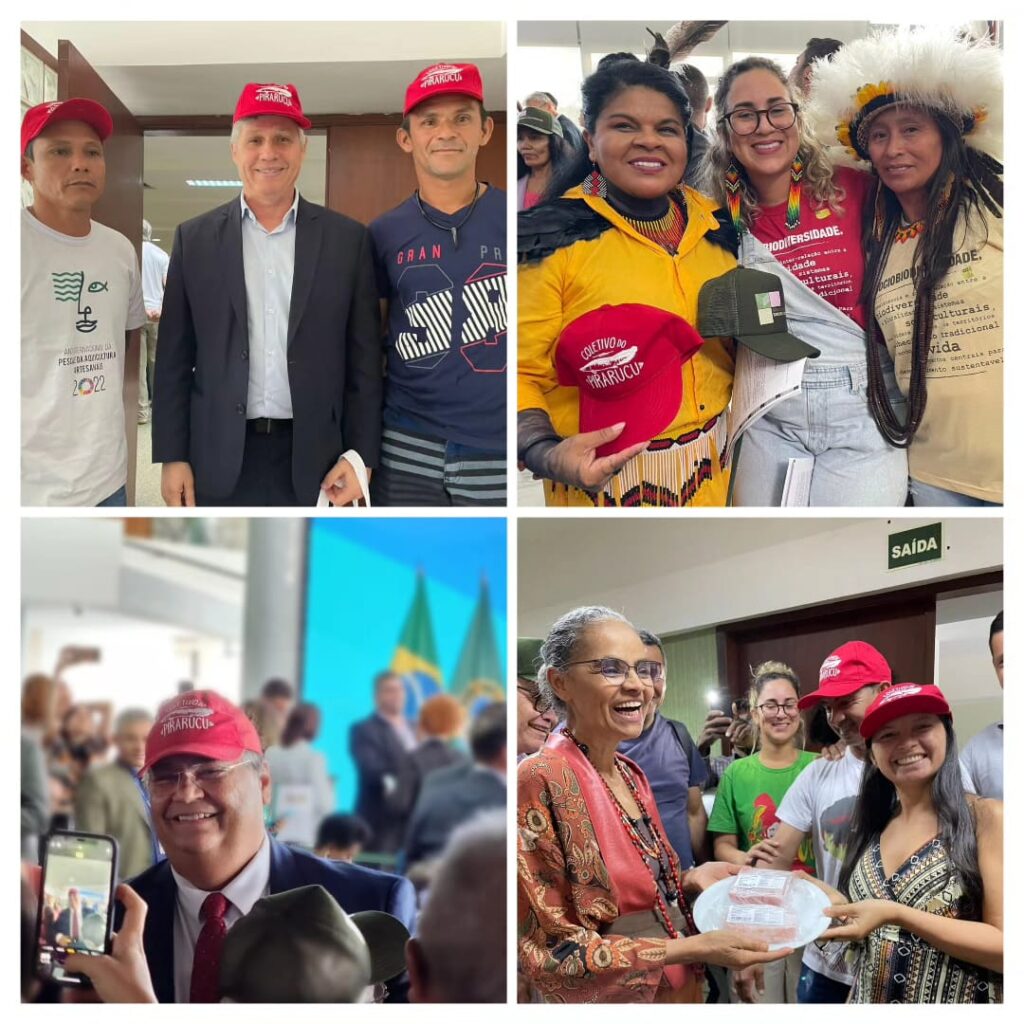
Also on Amazon Day, around 100 people attended the cinema session broadcasting in the CONTAG auditorium to watch the documentary “Pirarucu, the Breath of the Amazon”, a production by Banksia Films and Arapaima Collective. After the documentary screening arapaima handlers shared their testimonies about this activity, which serves as a successful exemple for the social and economic development of the Amazon.
Looking for the future: The legacy of SocioBiodiversity Week
Throughout the entire week, both in the external and internal agendas at the CONTAG headquarters, various partnerships were established, generating optimistic perspectives for the agendas of indigenous leaders, traditional extractivism people and communities, rural workers, peasants, and farmers.
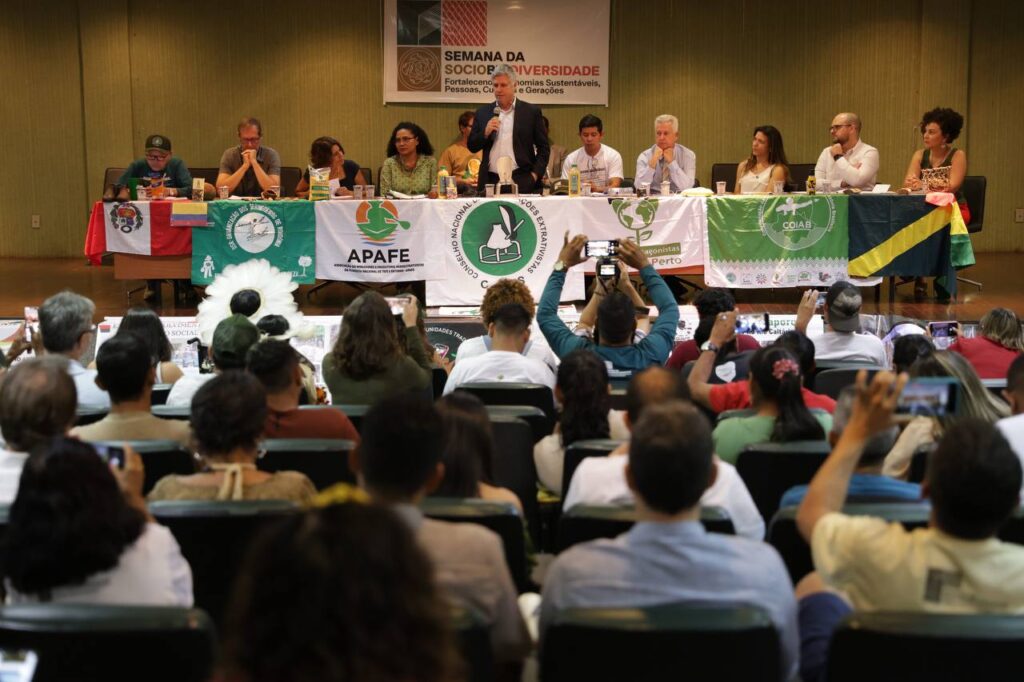
The Arapaima Collective sought to establish partnership with various government agencies to share progress and overcome challenges in the arapaima value chain. During the SocioBiodiversity week it was possible to meet with important representatives from different institutions, such as, IBAMA, ICMBio, MMA, MAPA, MDA and MPA. These meetings took place deliberately through invitations and participation in external events allowing for a valuable rapprochement between the collective and those responsible for key matters related to arapaima management.
The SocioBiodiversity Week is a result of partnership between the National Council of Extractive People, Chico Mendes Memorial, Native Amazon Operation, International Institute of Education of Brazil, Socio-biodiversity Economy Observatory, Socio Environmental Institute, and WWF Brazil with the support of various aligned organizations.


